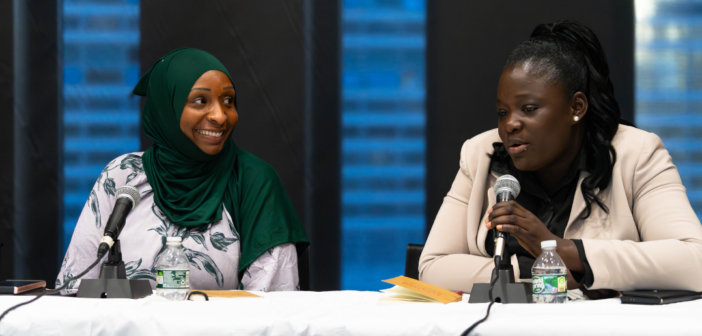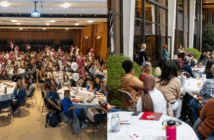This March, the Fordham University Graduate School of Social Service hosted three events of the first-annual Global Gender and Migration Forum, convened by the Center for Migration, Gender, and Justice.
The Global Forum took place from March 11 to 15. Additional partners included Her Migrant Hub, NYU’s School of Arts and Science Liberal Studies, The New School’s Zolberg Institute on Migration and Mobility, the Women’s Refugee Commission, and the Scholars Strategy Network.
The Graduate School of Social Service hosted the following panel discussions at our Lincoln Center campus:
- Local Approaches to Global Challenges: NYC, Migration, and Gender – Intergenerational & Multigenerational Practices
- Gender-Based Violence in Displacement Contexts
- Displacement, Gender, and Health in the Context of Venezuela
The following is a recap of the “Local Approaches to Global Challenges: NYC, Migration, and Gender – Intergenerational & Multigenerational Practices” event.
Local Approaches to Global Challenges
The event began on Tuesday, March 12, at 5 p.m. on the 12th floor of the Lowenstein Building, where over 50 professionals, students, and asylum seekers gathered to participate in a panel discussion.
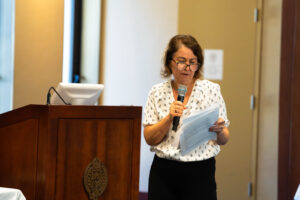
Marciana Popescu
“One hundred and seventy thousand migrants have come to New York City since the spring of 2022,” said Professor Marciana Popescu, Ph.D., as she welcomed the crowd. “And half of them are women and children. Not the same number have stayed. Where are they now?”
Popescu stressed that forced migration is a gendered issue, disproportionately impacting women and children who flee their home country for a variety of reasons. Whether that be to escape from trafficking or outdated, harmful cultural rituals, women all over the world travel to great lengths to reach freedom in America. However, their stories are often lost.
“Women are in the shadows; they remain invisible even though they are shaping the narrative,” Popescu said. “We want to bring those stories to the front. This is why we’re here today. It is the women’s voices that need to be centered and their guidance we need to follow.”
Breathing Life and Shining Light onto the Stories
Popescu’s words were reinforced by the panel discussion, which featured a harrowing testimonial about the hardships of forced migration.
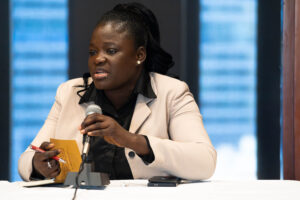
Marthe Kiemde
Her Migrant Hub co-founder and Mt. Sinai dietary associate Marthe Kiemde took to the mic to describe her journey from Burkina Faso, West Africa, in 2016. She, pregnant with her first child, and her husband sought asylum in the U.S.—hiding her late-term pregnancy from others even as she bled onto an airplane blanket. Kiemde said that if anyone found out about her condition, they would have forced her to stay in her home country, and she was desperate to leave.
“I heard that as soon as you put your foot in the U.S., you’re safe,” she said. “Your country can’t come and take you back.”
However, when she got to the U.S., Kiemde saw the country wasn’t perfect.
“At home, you have a place to sleep, but you’re not safe,” she said. “Then, you get to the U.S., you’re safe—but you don’t have a place to sleep.”
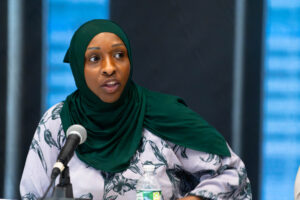
Adama Bah
Safety has been a large concern for Adama Bah, an immigrant rights activist, since her arrival in the U.S. in 1990 at the age of two. Following the September 11 attacks, Bah said she was the first female minor accused of terrorism — the CIA raided her apartment and deported her father, forcing her to drop out of school to support her family. She received asylum in 2007, and has done advocacy work since then.
“Along the way, you meet a lot of women from all over the world who are suffering,” she said. “And their stories are, ‘I had to leave because I would have been the R word, or, ‘I would have been forcefully married.”
Unfortunately, not everyone is willing to help—or even listen to—these women. She and five other women greeted the first bus of migrants sent from Texas to NYC, but didn’t receive much support from government bodies.
“When we asked the City to help us, they ignored us,” she said.
Good Work on the Ground
Despite the challenges, good work is being done today alongside Kiemde and Bah.
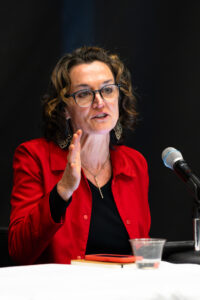
Trena Yonkerz-Talz
Trena Yonkerz-Talz serves as the Community Center, Outreach, and Accompaniment director at Our Lady of Mt. Carmel Church in the Bronx, and outlined how her organization’s programming has exploded since 2021. What started as two classes—one sewing and one computer class—to build community and upskilling among Latina women has transformed into 17 class offerings and a growing community.
“We have two ground rules when women come into our program,” Yonkers-Talz said. “One is that we are all equals here. The other is that we are all seen, we are all known, and we are all loved—because we know the minute we walk on the street, it’s different.”
Fordham M.S.W. student Johanna Miller currently interns with Her Migrant Hub, working to expand migrant resources and collaborating with activists to advocate for just housing policies. She sees herself filling a role of facilitator—helping women migrants obtain resources and get into rooms where they can use their voice to impact policy.
“There is so much good work being done on the ground. There is so much capacity in this room and in this city,” Miller said. “I think one of the roles of social work is to connect those resources.”
With the political polarization around immigration rising as the 2024 election draws near, one of the most crucial resources for migrants is legal protection. Liza Schwartzwald, GSS ‘18, director of economic justice and family development at the New York Immigration Coalition (NYIC), is currently working on a “150 million dollar ask” from the city government to provide legal resources for immigrants.
“Forced migration is going to continue as we see escalating climate crises and war crises,” she said. “What we need to do is find systemic solutions so that we know the path forward, and that the path forward isn’t something that’s going to hurt the people coming here.”
Challenges for Women Asylum Seekers
Panelists seemed to agree that one of the biggest obstacles women asylum seekers face when forcibly migrating to the U.S. is the shelter system.
Kiemde, who spent four years in the NYC shelter system, said she faced many acts of discrimination throughout her time—both inside and outside of the shelter. She also suffered from the lack of basic working amenities like microwaves. She explained that most migrant women do not want to stay in shelters, but since working papers are difficult to obtain, they are forced to remain in the system.
“Housing, childcare, and working papers,” she said. “If I had access to these things, I wouldn’t have had any mental issues.”
NYC’s 30- and 60-day shelter limit policies for immigrants—implemented in 2023 by the Adams administration—have also caused issues. Schwartzwald said a big problem arises when women migrants are forced out of shelters: organizations like the NYIC lose track of them.
“We may know who left the shelters and how many folks have stayed in. What we don’t necessarily know is what happens to them afterward,” she said.
What this leads to, Schwartzwald explained, is a reliance on “informal networks”—including other people’s couches, or even streetcorners. Since they’ve fallen off the radar of organizations like the NYIC, migrants no longer receive the resources they would have while in the shelter, thus resulting in unknown outcomes. Their stories are lost.
Even for those who remain in the system, cultural differences bring a load of stress when interacting with others, specifically those from state or federal government organizations, Bah added. Language is an obvious barrier for a migrant entering a new country, one that prevents the proper understanding of one’s whole story. Furthermore, cultural norms like lack of eye contact may be viewed with skepticism by government officials—perhaps she’s lying since she can’t look me in the eye—when really it’s something migrant women have been raised to do.
Additionally, Bah added, most migrants do not have a complete understanding of their rights when entering America. This knowledge gap leaves them vulnerable.
“It’s easy to take advantage of someone who doesn’t know their rights,” she said.
Impacting Policy Change
According to the Office of Disease Prevention and Health Promotion, housing is a social determinant of health (SDOH), defined by the Center for Disease Control (CDC) as “the nonmedical factors that influence health outcomes.” Miller expanded on how lack of housing can lead to a domino effect that imposes negative outcomes on migrants struggling to adapt to a new environment.
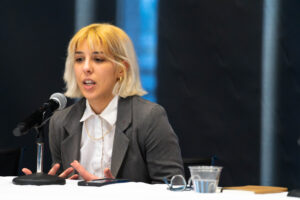
Johanna Miller
“Housing can exacerbate all kinds of problems,” she said. “It’s really hard to get a job, or health care…without a permanent address. New arrivals are facing the same kind of housing affordability crisis that the rest of New York is facing, without any of the social housing policies that alleviate some of that burden for lower income families.”
This housing situation can have even more downstream consequences, especially when paired with the nonexistent safe spaces for migrants to report abuse. Because women migrants do not have a refuge to report their abusers, they are forced to remain with them for fear of becoming homeless if they leave—since housing is out of reach.
“People in this room, you cannot stay silent,” Bah said. “You have to say that these policies don’t make any sense.”
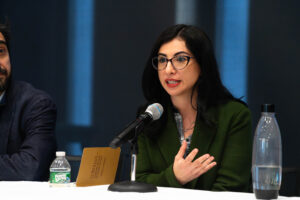
Liza Schwartzwald
Schwartzwald noted that not everything is negative. Along with winning a $63 million investment for legal and essential services last year, the NYIC introduced its Coverage4All campaign in 2022, which “expanded Medicaid coverage to all eligible women, regardless of immigration status, for up to 12 months post-pregnancy, and removed the citizenship requirements for access to Medicaid for those 65 years of age or older across New York State.”
“The City has the money…we have the solutions,” she said. “This is our money, and we have the right to demand progress reflective of the needs of people in the state.”
The panel agreed, adding that spending money for immigrant safety now would pay off in economic growth in the long run.
“If these people can work, the economy will thrive,” Kiemde said.
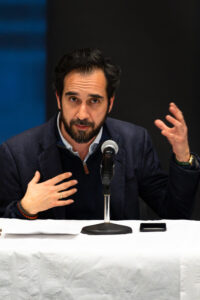
Achilles Kallergis
Panel moderator Achilles Kallergis said that in Canada, it takes five to ten days for an asylum seeker to get a work permit. It’s the system that’s the issue, he said—leaving the audience with a poignant recognition of immigration’s history in America.
“These discussions we’re having about the Venezuelans and the Haitians today…we’ve had these conversations before,” he said. “The Jews were not welcome; the Irish were not welcome; the Greeks were not welcome; the Italians were not welcome. They made their own space through their contributions to the economy, the culture, to everything that the city is today.”
“Capacity, strength, and promise—when we think of women with lived experiences of forced migration, those are the words I hope we take with us,” Popescu said in closing. “But the way to get there is by coming together.”
